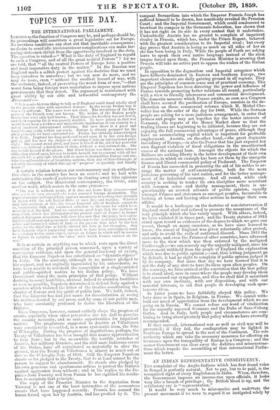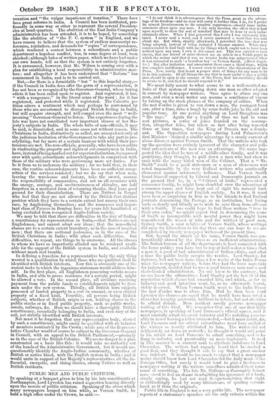AN INDIAN REPRESENTATIVE CONSTITUENCY.
THE complaint of the Anglo-Indians which has first found voice in Bengal is perfectly natural. Not to pay, but to be paid, is the recognized right of every Englishman in India. When, therefore, the Government imposes an income-tax upon officials, it looks very like a breach of privilege ; the British blood is up, and the retaliatory cry is " representation."
It would be very much to misconceive and underrate the present movement if we were to regard it as instigated solely by
vexation and "the vulgar impatience of taxation." There have been great reforms in India. A Council has been instituted, pro- fessedly in some way or other to represent the several Presiden- cies at head-quarters. The abolition of the East India Company's administration has been attended, it is to be hoped, by something like the abolition of "the P. C. system" in England, and we have reason to believe that the system of endless manuscript re- ferences, rejoinders, and demands for " copies " of correspondence, which rendered a contest between a subordinate and a public department a hopeless conflict, has, in some degree at least, been checked ; although bales of written paper, which we have had under our own hands, tell us that the system is not entirely forgotten. It is announced, however, that Mr. Wilson is coming over with a plan for establishing a local responsibility in administrative mat- ters; and altogether it has been understood that " Reform " has commenced in India, and is to be carried out.
But,—for there is a formidable " but " to this hopeful story,— if the Council in India does offer the germ of a representation, it has not been so recognized by the Governor-General, whose taxing edicts it has been called upon to register. And registered, it has, " with a vengeance," in the literal sense of the word ; for it has registered, and protested while it registered. The Calcutta pe- tition utters a sentiment which may perhaps be contemned by those who are accustomed to disregard British feeling in India, but will acquire strength, and will compel even the most " well- meaning " Governor-General to listen. The experiences during the late war have not conciliated very important classes of her Ma- jesty's subjects in India. The whole tribe of non-officials, it may be said, is dissatisfied, and in some cases not without reason. The Christians in India, distinctively so called, are annoyed not only at the judicious hesitation of the Government to take any part in pro- selytizing, but far more at a certain hauteur with which their pre- tensions are met. The non-officials, generally, who have been active in vindicating the property and rights of our countrymen in India, have, instead of being marked out for sup erior distinction, been passed over with quite subordinate acknowledgments in comparison with those of the military who were performing more set duties. Far be it from us to underrate the military ; for we hold that, in their case, the routine acknowledgments have been no sufficient recog- nition of the services rendered ; but we do say that when men, leaving the warehouse and factory, take the sword, assume the responsibility of commanders, and act on all occasions with the energy, courage, and unobtrusiveness of chivalry, are half forgotten in a muttered form of returning thanks, they have good ground for their dissatisfaction. There are Natives in Bengal who feel that they are not allowed by the British that distinct position which they have to a certain extent lost among their own race, by Anglicizing themselves ; and the numerous and impor- tant class of Parsees in Bombay have for years felt humiliated at being excluded from recognized Anglo-Indian society.
We may be told that there are difficulties in the way of finding a constituency for representation in India,—that Natives are not Englishmen, and cannot adopt our ideas ; that the non-official classes are to a certain extent transitory, as in the case of nautical men ; that there are sectional jealousies, as in the case of the British Christians in India ; with other such difficulties. But difficulties, we repeat, are things to be overcome. All the classes to whom we have so imperfectly alluded can be rendered avail- able for the support of the British system in India, and available without much real trouble.
In defining a franchise for a representative body the only thing wanted is a qualification by which those who are qualified shall be identified with British interests. Now this is obviously one of the easiest tasks to which the ingenious statesman would address him- self. In the first place, all Englishmen possessing certain means in India, and able to prove residence for a certain period, might be allowed a vote. In the second place, all civilians receiving payment from the public funds or establishments might be free- men under the new system. Thirdly, all British born subjects possessed of landed property to a cerhin amount, or even chattel property of a fixed kind. Fourthly, all persons being British subjects, whether of British origin or not, holding shares in the public stocks or in fixed public property, such as public works, canals, railways, &c. Here we should have a thoroughly British constituency, essentially belonging to India, and even racy of the soil, yet strictly identified with British interests. Nor must it be forgotten that any representative body, elected by such a constituency, might easily be qualified with an infusion of members nominated by the Crown ; while acts of the Represen- tative Chamber would of course be subject to the Governor-General in Council, with an appeal to the British Parliament,—precisely as in the case of the British Colonies. We see no danger in a plan constructed on a basis like this : it would take no authority out of the hands of the Administrative Government, but it would un- questionably identify the Anglo-Indian community, whether of British or native blood, with the English system in India ; and it would unite in support of her Majesty's representatives all the in- fluential, energetic, and rising classes, among Natives as well as British residents.



























 Previous page
Previous page